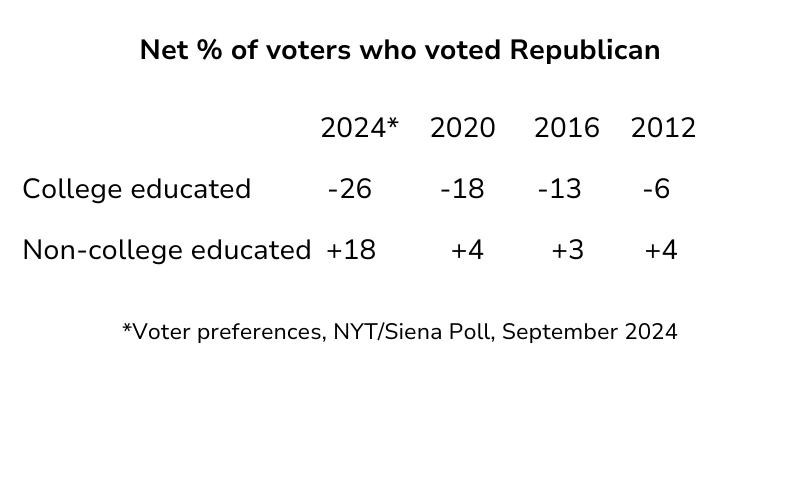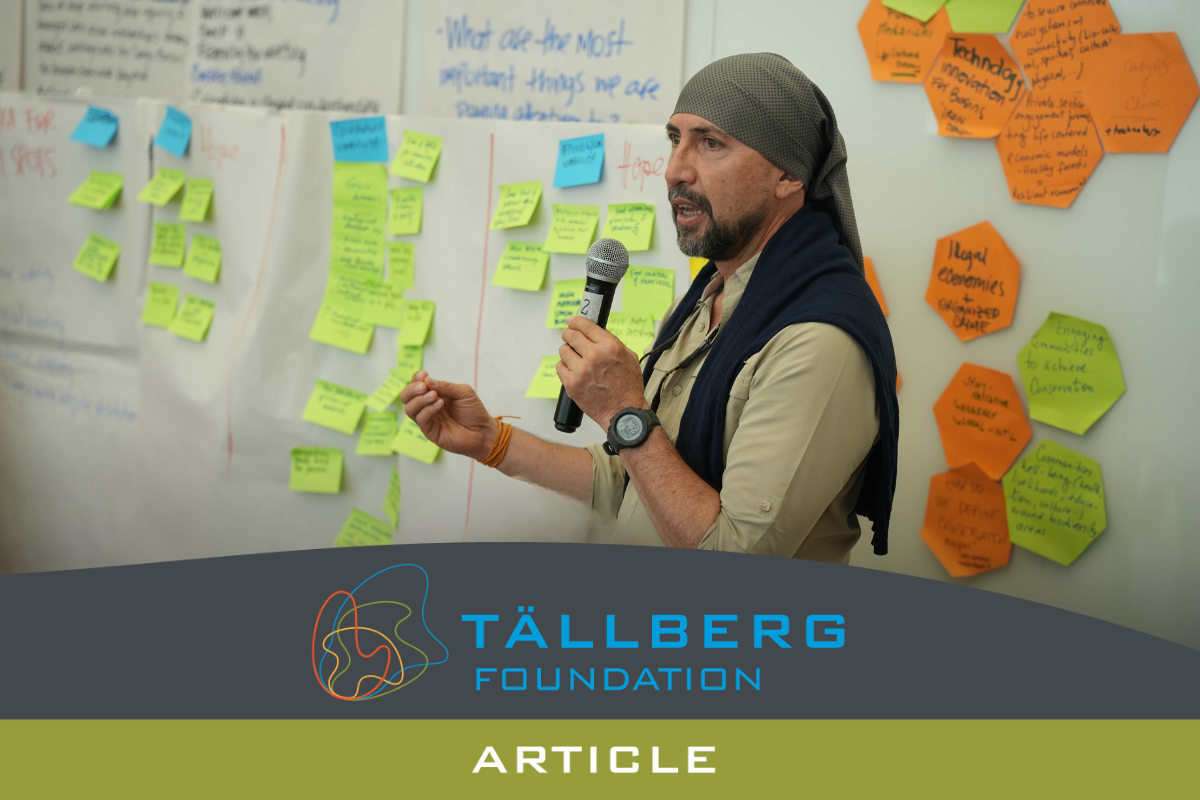Three-quarters of American voters think their country is headed in the wrong direction; half of all voters have unfavorable opinions about the two candidates on next month’s presidential ballot (although, of course, they obviously disagree on which candidate they like less). And many voters—perhaps most—share what U.S. political consultant Scott Miller recently described on New Thinking for a New World as a “rising tide of alienation and frustration with politics, the system, and our government.”
He argues that the election between Kamala Harris and Donald Trump is framed by a widely held set of voter concerns:
“They are losing their trust. They don’t trust government. They don’t trust big institutions. They don’t trust colleges. They don’t trust church. They obviously have lost their trust in the media…
84% of all voters, of all demographics, of all political stripes agree with this statement: ‘An elite of incumbent politicians of both parties, lobbyists, big banks, big unions, big business, big special interest, big media have rigged the system to protect their own power and prestige’….They believe that the system is so broken that it has made our government inept and corrupt.”
Above all, Miller insists, Americans want change: “95% of voters say they want [the political and economic system] to change.” Indeed, a New York Times poll early in the summer reported that 55% of respondents want major change while another 14% say the system should be torn down entirely.
The voters
As the election campaign heads into its final weeks, election polls show a race that is essentially tied, with almost every likely voter’s mind made up. Only 4% of voters say they are uncommitted, although Miller suspects that another 10% are what he calls “persuadables.” If so, they better hurry: election day is November 5, but at least half of voters will cast their ballots before then under America’s increasingly liberal voting laws.
What differentiates voters? One of the most interesting divides is along education lines. Simply put, if an American has a college degree, she is likely to vote for Harris; if not, then for Trump. Indeed, in a country where roughly 60% of voters do not have a degree, that is Trump’s primary potential pathway to victory.

“When I joined the Democrats back in the early 1970s, it was a blue-collar party,” says Miller. “Today it is urban, maybe advanced degree, certainly college-educated, as well as long-standing older Democrats who are just faithful to the party…Blacks still trust the Democrats more than the Republicans. But Hispanics are in play; Asians are in play.”
As for Trump, Miller argues that 20% of his supporters are hard-core loyalists. But most of the rest are working class. “Which means they have no college degree, they have less than $100,000 annual income. They are across the board demographically. They are pragmatic, by necessity [and] they are moderate by circumstances…They probably go to the church their parents went to. They probably send their kids to the school they went to. And when they go out on a work crew in the morning, they go with whoever the hell the company sends them out with. So they just learn to get along.”
It’s unclear whether issues really matter to how voters vote, although they have strong opinions about which candidate they trust to do better on a given issue. That said, most voters rank economic issues as of prime importance, while abortion is critical to an important segment of voters—but single-issue voters are becoming rare.

The campaigns
Miller is a campaign pro, having run or advised many national, state, and city campaigns during his long career, and he thinks Harris is doing a terrific job so far. “The Harris campaign has been stunningly good… considering that, when it began, her approval rating was about 35%— lower, in fact, than Trump and lower than Biden. And it is now at 44 and probably rising. That’s kind of amazing in the short time that she’s been campaigning…She came out to my surprise with great discipline…The energy she restored to the Party was amazing. The convention was just about perfect as a vibe convention, as she described it.”
In contrast, Trump “has run a terrible campaign…He’s running a sort of meandering campaign. Yes, there was some empathy, even sympathy for assassination attempt number one and maybe number two. But it’s not been a great campaign and JD Vance has not been a terrific addition.”
On the other hand, as amazing as it might seem, somehow Trump comes across as a “centrist; not too liberal, not too conservative.” And his negative view of America going down the drain resonates with many voters, especially those who are undecided or persuadable.
For Miller, Trump’s bottom line for the persuadable voters who will eventually decide the election is “after they say, ‘I’m worse off than I was four years ago,’ are they going to go in [to the voting booth] and say ‘But he’s just too damn crazy?” Miller points out they did the opposite in 2016, which is why Trump won.
The swing states
Of course, because the U.S. President is chosen by the Electoral College, which combines “winner take all” with a disproportionate weight for smaller population states, the election will ultimately be decided by a relative handful of voters in six or seven swing states. Miller points out that the Biden/Trump election in which 155 million people voted was effectively decided by 44,000 voters in three states. This year, he’s looking at 6 or 7 swing states: Pennsylvania, Michigan, Wisconsin, Georgia, North Carolina, Arizona, maybe Nevada—and, according to the NY Times/Sienna polling (which Miller believes is one of the best)—the candidates are virtually tied in those states, as they are nationally.

Thus, the undecideds, who comprise about 4% of the voters in each state, will eventually become the deciders!
One word about Electoral College votes. Based on how the other 43 states seem likely to vote, Harris would need to capture at least 44 of the swing states’ 93 electoral votes, while Trump would need 51. So, if Vice President Harris actually won Michigan, Pennsylvania, and Wisconsin where she currently enjoys a small lead, she would become President Harris.
The decision
How will the undecided decide?
Miller points out that, although every modern U.S. election seems to be about change, the mood of the electorate this cycle probably means that the candidate who captures the “change” flag will ultimately win the election. Miller notes that “Vice President Harris has done a terrific job of trying to change the context from liberal versus conservative to new versus old. If she’s new, she probably wins. If she’s more of the same, she probably loses.” The challenge is how to do that while running as an incumbent, chosen as the candidate by the vote of one man (Joe Biden) who isn’t particularly popular, trying to run on his record, while at the same time suggesting that she would be a better version of Biden.
That she has a lot of work to do is evidenced by a recent NY Times/Sienna national poll finding that 52% of respondents see Harris as representing “more of the same” and only 25% think she would make major changes. In contrast, almost 50% said that Trump represents major change; whether good change or bad change might be another story.
For all his campaign experience, at the end of the day Miller is surprised that the race is as tight as it is. “Something’s holding back Kamala Harris. I know there’s racism; I know there’s sexism; and I know there’s anti-Bidenism. She should be running away with this, but she’s not.”
Why not? Miller goes back to the sour mood that hangs over American politics: “People used to say that politics takes good people and makes them corrupt.Now they say, politics attracts corrupt people and makes them politicians.”
Donald Trump cannot persuade the persuadables that he is different, because he is not. Can Kamala Harris? Or was Pope Francis, in an extraordinary act of political interference, right when he recently said: “You must choose the lesser evil“? Who is the lesser evil? That lady, or that gentleman? I don’t know. Everyone, in conscience, (has to) think and do this.”
What do you think? Let us know in the comments below.
***
Scott Miller recently spoke with Alan Stoga as part of the Tällberg Foundation’s “New Thinking for a New World” podcast series. Listen to their conversation here or find us on a podcast platform of your choice (Apple podcast, Spotify, Google podcast, Youtube, etc.)
ABOUT SCOTT MILLER





My name is Francis Adie Ushie
I’m a former Presidential Aspirant, prior to the 2018 presidential election in Nigeria, on the platform of the African Democratic Congress — ADC party ..
I couldn’t become a substantive candidate, because Nigeria’s democracy is heavily monetized, which has given way to cabals, gangs and cartels to reign supreme..
I’m also an Economist, a writer, Research fellow and an Author, with membership to the Association of Nigerian Authors–ANA, Lagos chapter, Nigeria..
I’m also not new to Tall berg foundation…
Not taking much of your valued Time, I see Donald J Trump, winning on three strong grounds
(1) A divine hand backing him for speaking for the preservation of unborn babies ( so long there’s a divine commandment for humans to Respect life – which they cannot create nor re-create, no one should take a life) … religious beliefs would swing this in his favor..
(2) Democratic management..
He’s so marveric and convincing in his way of life, and that adds naturally to his aura…
(3) The Assassination attempt on his life, would also sway sympathy votes in his favor…
He’s not the best candidate Americans want, but Americans like “TALK AND ACT”….The Tel Aviv to Jerusalem is an example…
FOR KAMALA HARRIS:
(1) Americans like to set the pace for others to follow therefore, a first female president, would be a strong Factor for Kamala Harris ( the current vice president and Democratic Presidential flagbearer)
However, ego of men and jealousy by fellow women could attract low votes…
However, being in charge of government apparatuses, and being incumbent, could also play a pivotal role to Kamala Harris ‘ victory…
We can only pray for a better leadership..
I thank you for your time, patience and understanding..
Sincerely,
Francis Adie Ushie
franadie2010@gmail.com
Lagos, Nigeria
I appreciate the complex dynamics described here and the frustration many Americans feel toward the current political system. As someone who values authentic connection and growth, I find the widespread sense of alienation concerning. People feel unheard, and there’s a deep craving for change that goes beyond superficial political promises. It’s not just about choosing the “lesser evil” but about seeking a meaningful shift that addresses the root causes of distrust and disconnection.
The narrative of choosing between two candidates who both struggle with significant unfavorable opinions reflects a broader crisis of faith in institutions. The high percentage of voters who believe the system is rigged speaks to a shared experience of feeling powerless. This isn’t limited to one party; it spans demographics and backgrounds, highlighting a collective desire to reclaim a sense of agency and integrity in governance.
I see this moment as an opportunity to reframe the conversation. Instead of being stuck in a cycle of old versus new or liberal versus conservative, what if we centered the dialogue around community empowerment and genuine representation? The focus shouldn’t be solely on who’s more electable but on what kind of leadership can restore trust and foster a sense of belonging for all citizens.
The divide in voter behavior based on education, for example, shows the need for a political discourse that resonates with diverse lived experiences. Many working-class voters, who may lean toward Trump, express a pragmatic outlook shaped by their everyday realities, while college-educated voters might prioritize different concerns. Bridging these perspectives requires empathy and a commitment to addressing economic and social needs at their core.
Ultimately, the desire for change is clear, but it must be more than rhetoric. It should be about building structures that genuinely reflect the will and welfare of the people. This election presents a chance to redefine leadership in a way that values the humanity of every individual, rather than perpetuating a cycle of choosing between “lesser evils.” That kind of shift could begin to heal the disconnection and guide us toward a more unified, resilient society.